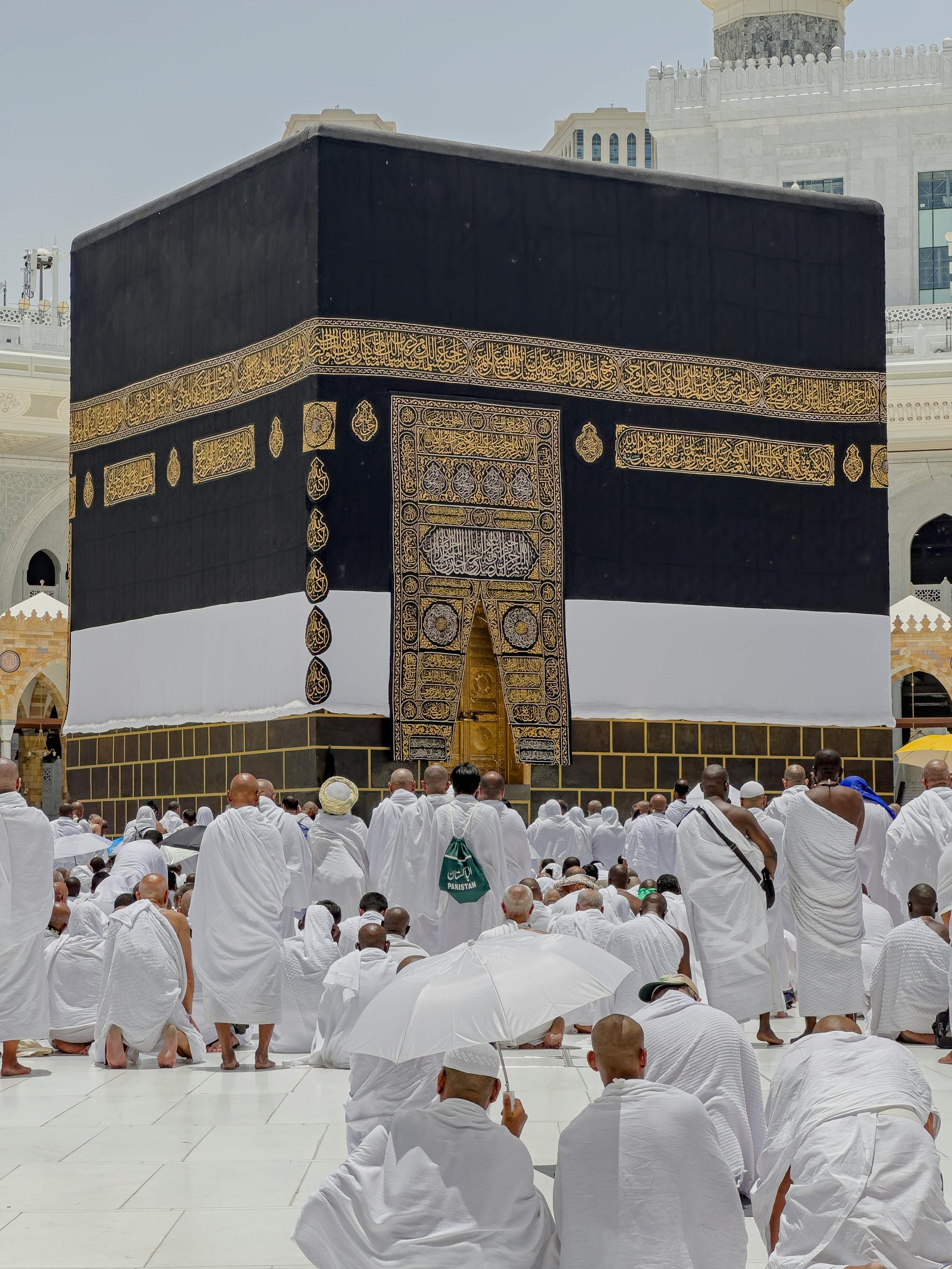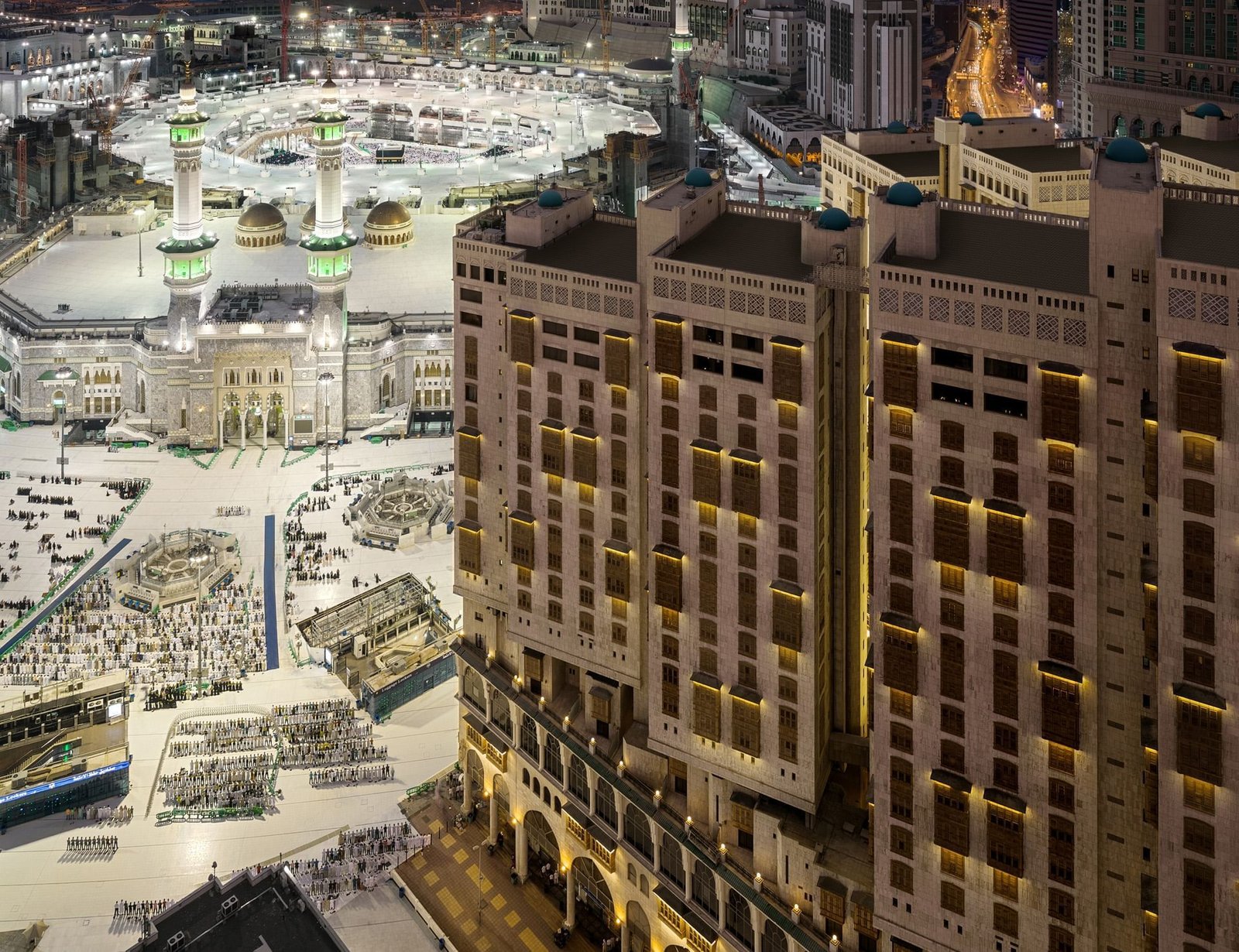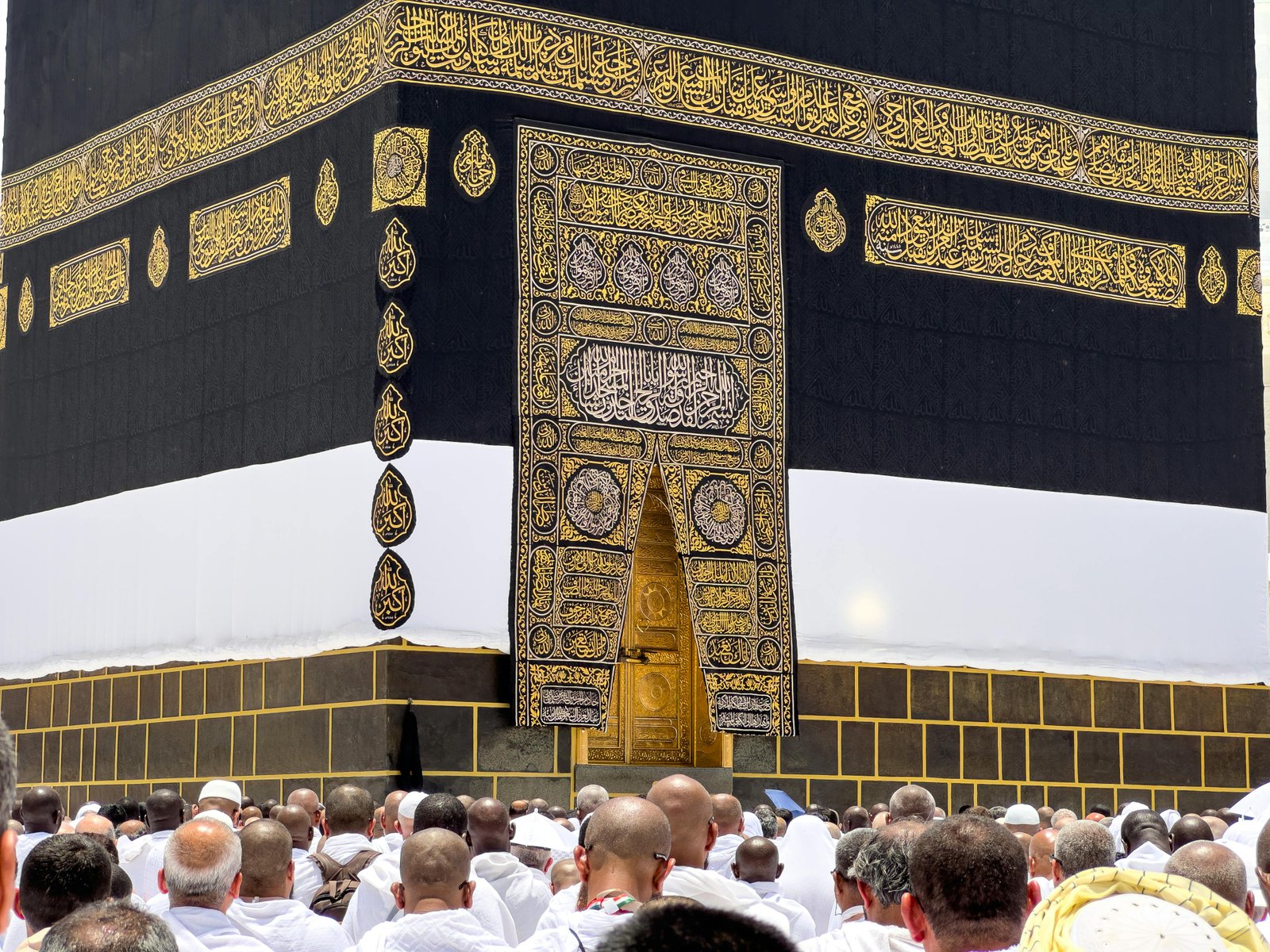Rites of Umrah
Assuming Ihraam:
Ihraam is a state of ritual consecration, which begins with uttering the Niyyah (intention) and ends with cutting the hair.
A) Where is one to enter Ihraam?
One is obliged to enter into the state of Ihraam at one of the Meeqaats (stations designated for Ihraam). He may not enter before or after. If he enters it after, it is invalid.

Image By Flickr
Note: The airplanes going to Hajj generally do not stop at the Meeqaats. So if one is taking an airplane, he may prepare for Ihraam from his home. Before reaching Meeqaat, the plane crew announces it, and at that point, he is required to enter the state of Ihraam by uttering the Niyyah.
B) Meeqaats:
Thul-Hulayfah (today: Abyaar ‘Ali): for people of Madeenah. It is recommended for people at this Meeqaat to pray two Rak’ahs, not for Ihraam, but because the place is blessed, as the Prophet sallallaahu alayhi wa sallam has told us.
Juhfah (today: Raabigh, near Juhfah), for the people (pilgrims coming from the direction) of Syria.
Qarn Al-Manaazil (As-Sayl), for the people of Najd.
Yalamlam, for the people of Yemen.
Thaat-‘Irq, for the people of Iraq.
These Meeqaats are also for anyone passing by them.
As for people living within these Meeqaats (near Makkah), they make Ihraam from their homes.
C) Preparation for Ihraam
Trim fingernails
Shave underarms and pubic hair
Men trim moustache
Perform Ghusl
Men: Apply perfume to head and beard (not garments)
Wear Ihraam clothes
D) Men’s Ihraam Clothing
Ridaa’ (upper garment) and Izaar (lower garment); both preferably white.
Shoes / Sandals must not cover ankles.
Note: right shoulder open only during Tawaaf.
E) Women’s Ihraam Clothing
Normal clothes, according to Islamic guidelines.
No Niqaab (sewn face cover with eye openings).
No gloves.
Can cover face with scarf, etc.
F) How does one enter Ihraam?
1. He should face the Qiblah (Ka’bah), and make Talbiyah, saying in a loud voice: “labbayk Allaahumma bi ‘Umrah” (Here I am, O Allaah, to make ‘Umrah).
2. If he fears that sickness or some condition may prevent him from completing the Hajj, he has the option of making a condition, by saying: “Allaahumma mahilli haythu habastani” (O Allaah, my place is wherever you prevent me). If he does this and is then prevented for some reason, he may leave Ihraam for ‘Umrah, and there will be no sacrifice required on him
At this point, he has entered Ihraam, and must observe all the conditions of a Muhrim (person in the state of Ihraam).
Note: If going by airplane, he should not assume the intention of Ihraam until right before flying over the Meeqaat (plane crew announces it), to ensure that he does not pass the Meeqaat without having made the intention and saying the required Talbiyah.
3. After making his Talbiyah for Hajj, he should say (while still facing the Qiblah): “Allaahumma haathihi hajjatun la riyaa’a feeha wala sum’ah” (O Allaah, this is a Hajj, free of wanting to be seen and wanting a high reputation by people).
Note: There are no special two Rak’ahs to be prayed for Ihraam, according to the Sunnah. However, if time for obligatory prayer has come in when one arrives at the Meeqaat, he should pray first then assume Ihraam. The two Rak’ahs of Waadi (vale of) Al-‘Aqeeq are not for Ihraam but because the place itself is blessed, as mentioned earlier.
G) What about Menstruating Women?
Also recommended to take Ghusl prior to Ihraam.
Must wear Ihraam clothes
Must utter Niyyah at the Meeqaat.
When pure, make Ghusl and perform ‘Umrah
H) Actions forbidden in the State of Ihraam:
1. Forbidden for men to wear fitted garments (shirts, trousers, garments, underpants, undershirts, Ihraam clothes with studs, etc.) or footwear covering the ankles. It is recommended (Sunnah) that men wear a white Ridaa’ (lower garment) and Izaar (upper garment).
2. Men may not wear anything covering their heads [such as caps, (Ghutrahs) kerchiefs, etc.] However, he is allowed to take the shade of a tent, umbrella, or other similar things.
3.Women may not wear Niqaab or gloves. That is, she cannot tie the Niqaab or anything similar around her face. However, she can cover her face by allowing her Khimaar, or Jilbaab (long and wide head cover), to hang over it, without tying it. And it is permissible for it to touch her face.
4. Perfume / perfumed products (like some types of shampoos, soaps, tissues).
5. Cutting fingernails
6. Cutting, shaving or removing any hair from the body. However, it is permissible for anyone who has some illness, which necessitates shaving. And he must give a Fidyah (compensation) of fasting 3 days, feeding 6 poor people, or sacrificing one sheep.
7. Sexual intercourse and anything which arouses sexual desire.
8. Any sins.
9. Argumentation, animosity, and disputes of all kinds.
10. Marriage proposals or any marriage contracts.
11. Hunting land animals, or having anything to do with their hunting (pointing towards the animal, etc.).
12. Eating from hunted animals, which were hunted for you, or which you helped in any way to hunt.
Rules of Makkah
1. Prohibited to cut down trees or pluck any plants.
2. Prohibited to hunt animals or birds, drive them out, or help in doing so.
3. Picking up dropped items on the ground.
The Talbiyah:
The pilgrim is ordered to raise his voice with the Talbiyah; women loud enough for next person to hear: : “labbayka allaahumma labbayk. labbayka la shareeka laka labbayk. innal-hamda wan-n’imata laka walmulk. La shareek lak.” (Here I am, O Allaah, here I am! You have no partner. Here I am. Indeed, all praise and every bounty is Yours, and all Dominion is Yours. You have no partner.)
– He may also say along with it, Laa ilaaha illallaah (there is no god worthy of worship except Allaah).
– He should continue to say the Talbiyah aloud until reaching Makkah.
Entering Makkah:
1. He should enter the Masjid with his right foot and say: “A’oothu billaahil- ‘Atheem wa biwajhihil- kareem wa sultaanihil- qadeem minash-Shaytaanir- rajeem. Bismillaah, Allaahumma salli wa sallim ala Muhammad, Allaahumma iftah li abwaaba rahmatik.” (I seek refuge with Allaah, the Greatest, and with His Glorious Face, and His Eternal Authority from the accursed Satan. In the Name of Allaah, O Allaah, send your peace and blessings on Muhammad. O Allaah, open up for me the doors of Your Mercy).
2. Once he sees the Ka’bah, he can raise his hands and say any supplication he wishes.
Tawaaf:
Note: Must have Wudhoo’ for Tawaaf.
1. Start at the Black Stone.
a) Say: “Bismillaah wallaahu Akbar” (first time only).
b) Touch the Black Stone with the hand and kiss it. One can also make Sajdah (prostration) on it.
c) If one cannot kiss it, he can touch it with his hand then kiss his hand.
d) If one cannot even touch it, he should signal toward it with his hand.
He should do this each time he passes the black stone, except say only “Allaahu Akbar” the other times.
2. He should start making Tawaaf, toward his left (counterclockwise). One Tawaaf is complete when he reaches the Black Stone again. First three rounds, he should walk quickly. Last four rounds, he walks normally.
3. Each time he passes the Yemeni corner (the corner BEFORE the Black Stone, he should try to touch it but not kiss it. If he cannot touch it, he should NOT signal toward it.
4. As he is going between the Yemeni corner and the Black Stone, he should say (the verse which means): “Our Lord, give us in this world [that which is] good and in the Hereafter [that which is] good and protect us from the punishment of the Fire.” [Quran 2:201]
5. Throughout his Tawaaf, he should make all kinds of Thikr (remembrance of Allaah) and Al-Marwah” (supplication). There is no prescribed Thikr. He should avoid talking unnecessarily. The Prophet sallallaahu alayhi wa sallam said: “Tawaaf around the House (Ka’bah) is prayer, except that Allaah has made speaking lawful in it. But whoever speaks let him only say good.” [Ibn Hibbaan and others]
Maqaam Ibraaheem and Zamzam:
6. After completing Tawaaf, the men should cover their right shoulders. Then the pilgrim goes to Maqaam Ibraaheem, while reciting the verse (which means):
“And take, [O believers], from the standing place of Abraham a place of prayer.” [Quran 2: 125]
7. He should stand such that Maqaam Ibraaheem is between himself and the Ka’bah and should pray two Rak’ahs. In the first Rak’ah, he should recite Soorat (chapter) Al-Kaafiroon (No. 109), and in the second Rak’ah, he should recite Soorat Al-Ikhlaas (No.112).
Note: If there is no space at Maqaam Ibraaheem, pray anywhere.
8. He should then go to the Zamzam well, drink his fill of Zamzam water (remembering to make Al-Marwah”), and can pour some over his head.
9. He should return to the Black Stone, make Takbeer, and touch it.
Sa’y Between As-Safa and Al-Marwah:
Note: It is not obligatory to have Wudhoo’ for Sa’y, but preferable.
10. Starting with the bottom of As-Safa, he recites the verse (which means):
“Indeed, As-Safa and Al-Marwah are among the symbols of Allah . So whoever makes Hajj to the House or performs ‘Umrah – there is no blame upon him for walking between them. And whoever volunteers good – then indeed, Allah is appreciative and Knowing.” [Quran 2:158]
Then he should say: “Nabda’ bima bada’a Allaahu bih,” “We begin with what Allaah began with.”
He says this only once (at the beginning), and not each round of Sa’y.
11. He climbs As-Safa until he can see the Ka’bah, then faces the Ka’bah and says the following Takbeer:
“Allaahu Akbar, Allaahu Akbar, Allaahu Akbar. La ilaaha illallaahu wahdahu la shareeka lahu, lahul-mulku wa lahul-hamdu yuhyee wa yumeetu wa huwa ala kulli shay’in qadeer. La ilaaha illallaahu wahdahu anjaza wa’dahu wa nasara ‘abdahu wa hazamal- ahzaaba wahdah.”
He may then make any Al-Marwah’ and Thikr he wishes.
12. He makes Sa’y (walks) to Al-Marwah, running while he is between the two green posts. He ascends its, faces the Ka’bah, and says the same as he did while he was on As-Safa. This completes one circuit.
13. He repeats this until 7 circuits have been completed, finishing at Al-Marwah.
Leaving State of Ihraam:
14. He then shortens his hair, ending the ‘Umrah. Men shorten their hair from all over, or shave their hair. Shaving is preferable.
Women cut about one fingertip of their hair from one place.
He has then left the state of Ihraam and his ‘Umrah is complete.
Article by: Islamweb.net




